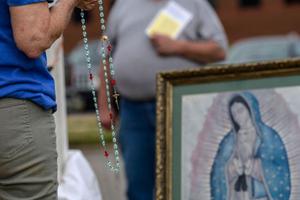Listen Closely to Pop Singer’s Heartfelt Testimony: Abortion Regret Is Real
COMMENTARY: To love and to be loved is at the heart of what it means to be human. Kaya Jones found out, the sexual revolution assures us that ‘love is love,’ all the while rewriting the real meaning of lifelong, self-giving love.

“Kaya Jones, a former singer for The Pussycat Dolls, said the abortions she had when she was younger still haunt her to this day,” begins the Fox News story in which the pop singer recounts her abortion regret. The significance of this story is not that some women regret their abortions. This fact has been known among specialists for some time. No, the significance of this story is that someone with a public platform is finally speaking out and that someone in the legacy news media is finally listening.
Longtime pro-lifers and faithful Catholics know perfectly well that abortion has been taking a toll on women. Elements of Jones’ story are consistent with concerns pro-lifers have long expressed. She “explained how she had her first abortion as a teenager when her birth control medication failed.”
We’ve been saying for years that birth-control methods sometimes fail. When they do, the woman is set up for an abortion. That is why we say that contraception and abortion are fruits of the same tree: the idea that everyone can have as much sex as they want without worrying about a baby resulting.
The contraceptive ideology teaches all of us that sex is normally a sterile activity. The ideologues never get around to telling the whole truth about contraceptive failure.
Jones’ testimony also supports the concern that the availability of abortion sets women up for exploitation by unscrupulous men. Pro-lifers have long contended that predatory men can use the unrestricted abortion license to cover their crimes and indiscretions. This very sort of thing happened to Kaya Jones.
Describing her second abortion, “she recalled how she became pregnant again while in the Pussycat Dolls and was told to ‘get rid of it.’” In a 2017 interview, Jones had claimed that the singing group and others were fronts for a “prostitution ring.” She claimed that “the singers were ‘passed around’ and ‘abused’ by industry executives.” Of course, the organizer of the Pussycat Dolls denied it all.
“I wasn’t in a girl group. I was in a prostitution ring. Oh & we happened to sing & be famous. While everyone who owned us made the $,” Jones tweeted back in 2017. At that time, she was responding to the suicide death of another pop singer, 24-year-old Simone Battle.
These exploitive situations are par for the revolutionary course. We are all supposed to be “sex positive,” which means being okay with having sex, even with strangers. Even if the woman feels used and degraded, she is an adult, capable of making meaningful choices.
So her hurt feelings are no one’s problem but her own. So say the shameless men who use them and the equally shameless women who arrange for them to be used. “To be apart (sic) of the team you must be a team player. Meaning sleep with whoever they say,” she claimed.
The Fox News interview continues with this observation: “The former singer also argued that abortion led to a breakdown in respect between men and women in the culture.” Miss Jones could be channeling the late, great Pope St. Paul VI, when she stated, “What you’re showing men is that you don’t value yourself or your seed or their seed, and in return they don’t value us as women because we’re willing to do these things to ourselves and to our children.”
For me, this statement was the saddest of all: “I’ve gone through it all. I will assure you, you will regret it your whole life. Nothing — even if I become a mother tomorrow and happily married and all is well, I’m still going to regret the three children I did not have,” she said.
Reading between the lines, what do we see? She wishes she were happily married. She wishes she had children to love — and not just any children, but those three particular children.
This longing for love is written on every human heart, placed there by Almighty God himself. To love and to be loved is at the heart of what it means to be human. The sexual revolution assures us that “love is love,” all the while rewriting the real meaning of lifelong, self-giving love.
Back in 2013, the Ruth Institute began in earnest to publicize the harms of the sexual revolution. After the disastrous Supreme Court rulings overturning the Defense of Marriage Act, and California’s Proposition 8, we became acutely aware that the purveyors of sexual license held the commanding heights of every significant branch of American culture.
These court rulings illustrated that the sexual revolutionaries had enough power to rewrite the law as they went along. We asked ourselves, what can we do in the face of such a powerful and determined opposition? We knew we needed to get more troops in the field. The ordinary men and women, mothers and fathers, children and grandchildren whose lives have been damaged by the sexual revolution needed a voice.
The fact is: Millions of people have been harmed by its perverse dogmas — children of divorce; refugees from the hook-up culture and the “LGBT” subculture; people who regret their years of cohabitation; and, yes, women who regret their abortions.
Kaya Jones’ testimony will encourage and embolden others to share their stories. Her heartfelt regret may dissuade other women from having abortions. Her strong language may shame some of the currently shameless exploiters of women to change their ways. Jones’ testimony is a great contribution to the great cause of defending marriage, life and family and building a civilization of love.
- Keywords:
- post-abortion healing
- abortion regret















